CNA: From lawyer to insect farmer: Malaysian entrepreneur touts roasted crickets as healthy, sustainable snack
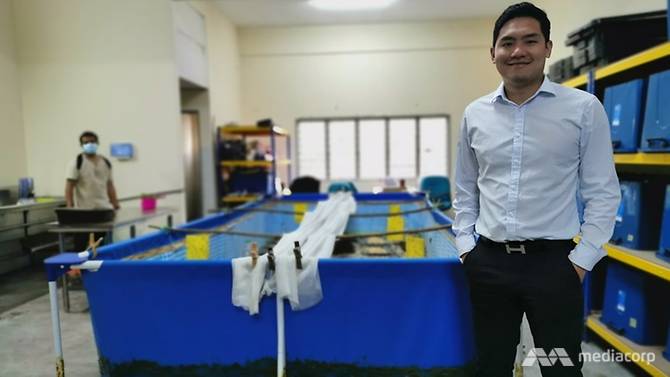
KUALA LUMPUR: Large blue containers containing around a million crickets filled a shophouse in Kuala Lumpur. The entire unit is fully sealed like a prison, with all windows closed. There is no air-conditioning or electric fan so that the environment is warm, humid and dark all day.
When Mr Kevin Wu opened the door of his farm in Petaling Jaya, a chorus of chirping crickets was immediately heard.
The critters scurried around in the containers, housed in separate areas depending on the different stages of their life cycles.
While crickets may be pests for some, Mr Wu is turning them into a niche business – food for human consumption.
“They’re crispy and fill you up quickly. They (consumers) would never know until they have tried,” said Mr Wu, founder and CEO of his company Ento.
“We have a lot of return customers who are conscious about their health and fitness. Our snacks keep them full for longer, because crickets are really high in fibre - four times the fibre (amount as compared to) oatmeal," said the 26-year-old.
"So instead of four handful of nuts, they have one handful of crickets and they will feel full for longer.”
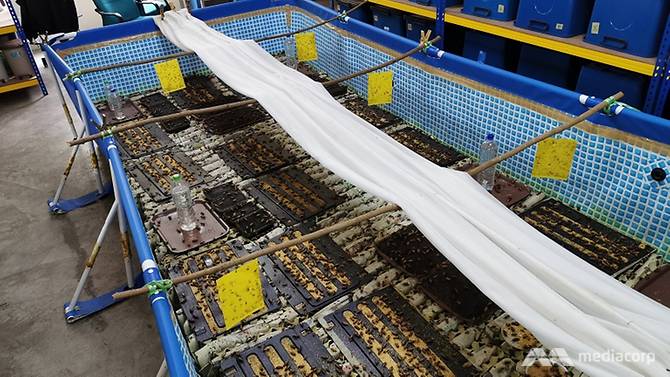
The farm is located in a shop house in a secluded part of Malaysia's capital Kuala Lumpur. (Photo: Amir Yusof)
Mr Wu started Ento in May last year, setting up the pilot farm to breed crickets, followed by roasting and flavouring them.
The “artisanal” bugs are bred in blue containers, before they are frozen to death. They are then slowly roasted before being put into colourful packaging and sold online. Each 25g bag costs RM19.90 (US$4.83)
In March, Ento expanded its product line to include cricket granola bites and cricket powder. The powder is sold to food manufacturers in America and Europe, who turn them into other products like protein shakes or bars, burgers and even pasta.
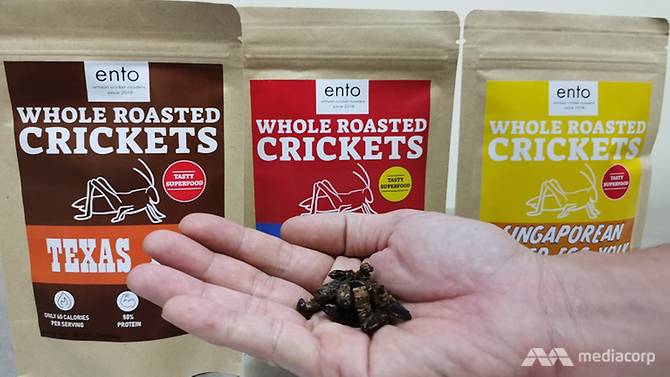
Mr Wu said the roasted crickets are crunchy, and they are lightly flavoured to appeal to consumers in the region. Flavours include Texas Barbeque, Korean Kimchi and Singaporean Salted Egg Yolk. (Photo: Amir Yusof)
Mr Wu's journey from law to cricket farming was a recent one.
As a trained lawyer, he was called to the Malaysian Bar as an Advocate & Solicitor in 2018, but decided to pursue his passion in sustainability and entrepreneurship.
“Law wasn’t really for me, I’ve always been drawn to the entrepreneurial lifestyle and the nature of the job,” said Mr Wu, who also operates a furniture retail company.
“Law is great, it’s something I really enjoy and I have lots of friends in law but it wasn’t for me. It was a personal decision,” he added.
QUEST FOR SUSTAINABLE FOOD
He decided to open a cricket farm was after reading a United Nations article on food sustainability, which proposed insect protein to feed the growing world population.
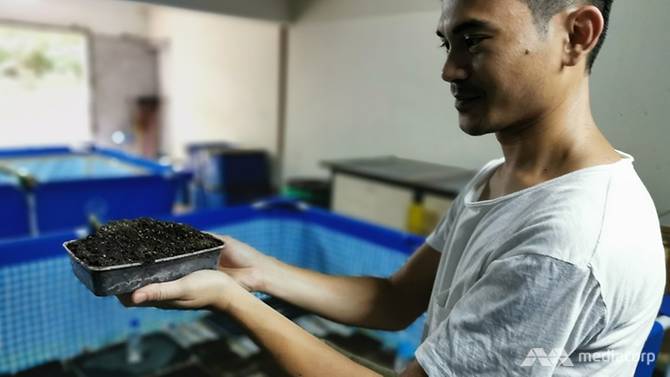
One of Mr Wu's employees, Nik Muhammad, said that the farm is largely self-sufficient as it breeds its own supply of crickets. (Photo: Amir Yusof)
“Consumers should move towards healthy options and sustainable options, we are trying to be part of the solution to food sustainability,” said Mr Wu.
He saw cricket as an avenue because farming would not require a lot of feed, and can be conducted in a small space. Mr Wu also noted that land is relatively cheap in Malaysia, and it has a comparative advantage over other countries due to its natural tropical climate to breed the insects.
Less feed, water, land and greenhouse gases will be needed for a cricket farm, as compared to a cow farm for example, Mr Wu remarked, making it a more environmentally-friendly protein-packed option.
“The farm is in a quiet part of Kuala Lumpur. Because this is a pilot farm, it has to be close to where all of us live, instead of something really far out. (This shophouse) is ready-built, quite convenient and suitable for urban farming,” he said.
"BEST WAY TO GET PEOPLE TO EAT INSECTS IS TO LET THEM TRY"
Mr Wu is cognisant of the natural aversion of many people to eating insects. But he wants to persuade them to move away from following “the western diet” and explore the footsteps of people from fellow Southeast Asian countries – like Thailand, Cambodia and Laos – who eat insects as part of their staple diet.
“In fact, most of the people around the world are already eating insects as part of their diet, but it's not mainstream in western countries, and these are the countries that are influencing cultures around the world,” he noted.
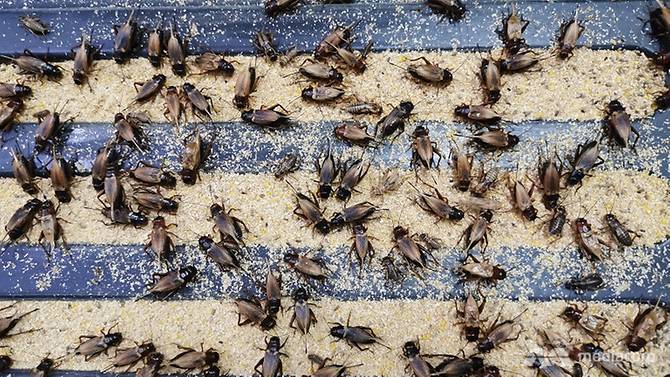
The average lifespan of a cricket is two months. At Mr Wu's farm, they are harvested such that the oldest and youngest crickets will be two weeks apart. (Photo: Amir Yusof)
“The best way to get people to eat insects is to let them try. It’s not an overnight change, it will take years, but I think we’re playing a big role in the future,” he added.
Mr Wu is confident his business will be profitable in the long run. Since it started marketing operations in March, the company has raked in RM30,000 in revenue and is looking at expanding operations.
“There’s more awareness, but for developing countries like Malaysia, it’s tough to get everyone on board. But we believe the attitudes will change, we will just start small and work on one customer at a time,” said Mr Wu.
“It has been quite an enjoyable journey and it’s stressful, but I believe we’re building something great for the future.”

doxycycline vet canada[/url]